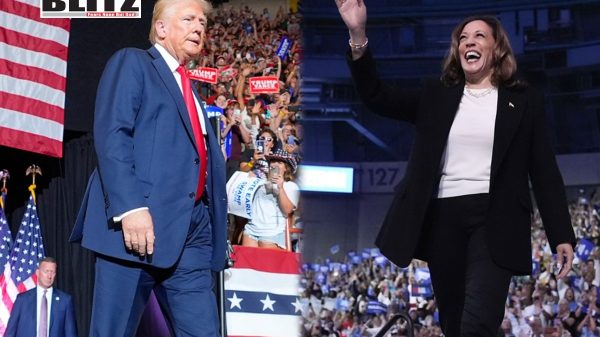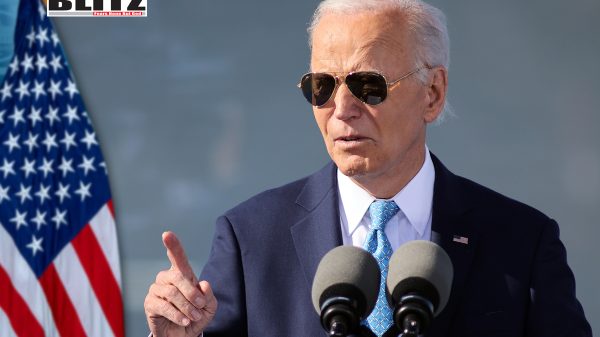Trump rallies in New York as Harris campaigns in Philadelphia
- Update Time : Monday, October 28, 2024

As Election Day approaches, the US political landscape is charged with fervor as both Donald Trump and Kamala Harris rally in crucial battleground states. On Sunday, October 27, Trump is set to hold a high-profile event at New York’s Madison Square Garden, a symbolic return to his home turf that, while deeply Democratic, remains vital to his visibility. Meanwhile, Harris is focusing on a grassroots outreach strategy in Philadelphia, a critical city in must-win Pennsylvania, as she pushes to energize her base and sway undecided voters.
With the November 5 vote looming, polls show a deadlock between the candidates. Both Harris and Trump are on a final sprint to tip the scales in what has become one of America’s most divisive, suspense-filled electoral races.
Trump’s rally at Madison Square Garden, often called “The World’s Most Famous Arena,” will take place in front of nearly 20,000 supporters. The historic arena has hosted legendary cultural figures and political events alike, but it is not without a controversial past. In 1939, it served as a venue for the far-right German-American Bund rally, complete with Nazi insignia and salutes, an association that continues to draw criticism as Trump takes the stage decades later.
With the rally set to feature high-profile backers such as billionaire Elon Musk, Trump’s team is pulling out all the stops. Musk, who has been actively campaigning for Trump, lends the former president additional star power and credibility among certain voter demographics. For Trump, who has retained significant popularity among Republican voters, this rally is an opportunity to present his message of returning America to its former “greatness,” while asserting his controversial stance on the 2020 election results. Unwilling to accept his previous defeat, Trump has continued to fuel doubts about the integrity of the electoral process, a position that threatens to cast a shadow over the upcoming vote.
Just days before, one of Trump’s top former officials, John Kelly, accused him of embodying “fascist” characteristics, a sentiment that Harris openly agreed with, adding fuel to an already polarized campaign season. Yet, Trump remains undeterred, and his team expects the event to draw substantial media attention in New York, where he still commands an influential following. Trump’s rhetoric is likely to focus on painting his opponent as a risk to American values while appealing to his base’s concerns about economic stability, national security, and individual freedoms.
In contrast to Trump’s high-energy arena event, Harris’s Sunday will be spent connecting with Philadelphians at the local level. She has a packed schedule that includes stops at a Black church, a barbershop, and a Puerto Rican restaurant. Pennsylvania, a keystone in the electoral map, is crucial to Harris’s strategy, as it was for Biden in 2020. Since Biden’s unexpected withdrawal in July, Harris has visited the state 14 times, underscoring its importance to the Democratic path to victory.
Harris’s campaign officials describe this visit as part of her “closing argument” to American voters. Harris is set to deliver her final message on October 22 in Washington, DC, at the same park where Trump once addressed supporters before the January 6 Capitol incident. This venue choice symbolizes a stark contrast with her opponent, highlighting her focus on unity and stability versus Trump’s more controversial legacy.
Harris’s outreach includes issues central to the Democratic platform, such as racial equity, healthcare, and economic support for working-class families. Her message resonates particularly with minority and urban voters who are essential to winning Pennsylvania. However, the race has tightened, and her campaign is under pressure as former First Lady Michelle Obama expressed “genuine fear” over the possibility of a Trump victory. Obama praised Harris as an “extraordinary” leader but shared her concerns over the narrowing polls, which suggest that Harris may need to expand her appeal to ensure a win in these final days.
“My hope about Kamala is also accompanied by some genuine fear,” Obama stated, adding that it is “frustrating” to see the race so close given Trump’s previous record. Her remarks capture the broader anxiety among Democrats who view this election as a referendum on American democracy and fear the potential impact of another Trump administration.
The 2024 election is historic in more ways than one. Harris, 60, stands to become the first female president if elected, a milestone that carries profound significance for many Americans. On the other hand, Trump, 78, would be the oldest candidate to win the presidency. Both candidates represent pivotal junctures in American politics, with Harris symbolizing a continuation of progressive policies and Trump vowing to return the nation to its pre-2020 political landscape.
This race has driven unprecedented early voting, with over 40 million ballots already cast. For many Americans, the choice between Harris and Trump goes beyond policy differences, representing two divergent visions for the nation’s future. Trump’s campaign is banking on his appeal in key “blue wall” states he won in 2016, including Michigan, Wisconsin, and Pennsylvania, as well as the Sun Belt swing states that could prove decisive.
Given Trump’s refusal to concede his previous loss, many Americans are bracing for the possibility of a contested election if he loses again. His persistence in casting doubt on the electoral system has left some fearing a repeat of January 6-level unrest. Trump’s willingness to reject any outcome unfavorable to him could potentially lead to a prolonged legal struggle, with significant implications for the stability of U.S. democracy.
In the backdrop, Harris’s October 22 speech in Washington serves as a stark reminder of the stakes of this election. By choosing a location with symbolic ties to recent unrest, Harris seeks to underscore her commitment to preserving democratic principles while drawing a sharp contrast to her opponent.
For Trump, a victory would mean a restoration of his vision of America, one rooted in nationalist principles and economic independence. He has promised to focus on “America First” policies, seeking to appeal to voters who feel alienated by Washington’s recent direction. His surrogates, including Musk, have rallied around these themes, suggesting a continued emphasis on deregulation, a strong stance on immigration, and a rollback of Biden-era climate policies.
For Harris, the stakes are equally high. As the potential first female president, she represents an historic step forward for gender representation in the highest office. Her platform focuses on healthcare, climate change, and equality, aiming to continue the policies set by the Biden administration. By visiting diverse communities in Pennsylvania, she seeks to demonstrate an administration centered on inclusivity and responsive to the concerns of everyday Americans.
This final week of campaigning represents a critical juncture in what has been a fiercely contested race. The contrast between Trump’s rally at Madison Square Garden and Harris’s grassroots outreach in Philadelphia captures the essence of their different campaign strategies and messages. With just days left until the vote, the outcome remains anyone’s guess, as both candidates seek to tip the scales in their favor.
In the end, Americans face a historic choice that will shape the nation’s future for years to come. Whether voters choose the vision presented by Harris or the one Trump embodies, the ramifications will extend beyond the next four years, influencing the country’s standing on the global stage, its domestic policies, and its commitment to democratic values. .














Leave a Reply